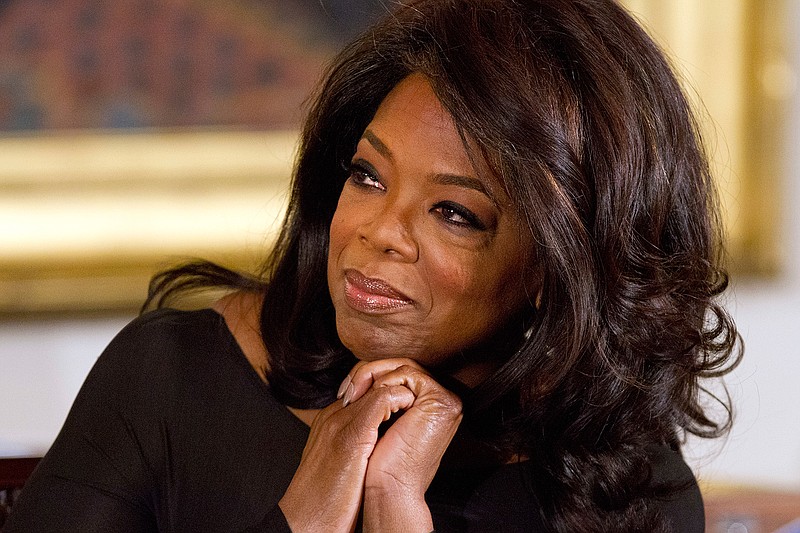LOS ANGELES-Oprah Winfrey had one of the great successes in modern television with the long-running "The Oprah Winfrey Show." The syndicated talk program was a cultural phenomenon and ratings juggernaut that changed how American consumers shopped and thought and anchored a series of flourishing businesses.
Winfrey ended the show in 2011 after 25 years on the air. Her business track record since then has been more mixed.
With the prospect of the mogul challenging President Donald Trump at once galvanizing progressives and repelling conservatives, that résumé is likely to be scrutinized. Many of the discussions after Winfrey's rousing Golden Globes speech center on questions of politics and personality. But not to be discounted is her record as an entrepreneur post-show.
Winfrey's biggest swing has been with OWN, the basic-cable network she launched seven years ago in 80 million homes as a 50-50 joint venture between her Harpo, Inc. and Discovery. A ratings drag in its early years-much of its self-help-oriented programming did not land, hindered by the fact that Winfrey did not appear in it-and a series of layoffs followed.
But the network has seen its fortunes turn, somewhat, in the past few years, and Discovery executives have said over this time that the network is profitable.
That's in part due to a raft of scripted (and, notably, more expensive) shows, including the Ava DuVernay series "Queen Sugar," an epic drama about Louisiana siblings that wound down its second season in the fall, and the soap-opera "Greenleaf," Craig Wright's show about the rivalries at a Memphis megachurch.
"Queen Sugar" was a sensation its first season and began its second season strong, with 2.3 million same-day viewers-the second-highest in the history of the series. But this success is muted: It had dwindled somewhat, to just over 1 million same-day viewers, by the end of the season.
A similar fate befell "Greenleaf," which kicked off its first season with more than 3 million same-day viewers and had seen those numbers drop to just over 1.4 million in the second-season finale in September.
In December, Winfrey signaled a retreat from the venture, selling 24.5 percent of OWN to Discovery for $70 million, leaving her with just 25.5 percent. (She did re-up her contract with it for eight more years.)
Winfrey's empire is no doubt lucrative-Forbes put her worth at $3 billion in 2017, making her the world's richest African American. (Incidentally, that level of business success, while helping to cement her case for the country's top executive position, could also paradoxically be a stumbling block to it. The Ethics Reform Act of 1989 forbids many government officials from allowing their names to be used by an outfit that "provides professional services involving a fiduciary relationship." Like the man she would presumably challenge, Winfrey would seem to be a prime candidate for this statute, since much of her success is tied to her brand.)
Still, much of her wealth comes from the "The Oprah Winfrey Show," which she owned outright. Otherwise she has scaled back her business holdings since she ended her afternoon fixture. Within the past five years, Winfrey has either sold or shuttered Harpo Films, Harpo Radio and Harpo Studios, the sprawling Chicago complex from which she long ran her operations. Only the publishing and production units remain. (The cable network rents four floors of space at the chic West Hollywood office complex The Lot.)
Harpo Radio, for instance, was launched to some fanfare in 2006, a Sirius channel that featured Winfrey stalwarts such as Mehmet Oz and Nate Berkus. But the station was scrapped at the end of 2014.
Many of Winfrey's assets these days come in a less tangible form-via her star power. Winfrey has gained solid marks for her appearances as a correspondent on "60 Minutes" and recommitted to acting since "The Oprah Winfrey" show ended, with roles in the 2017 HBO movie "The Immortal Life of Henrietta Lacks," the DuVernay-directed 2014 film "Selma" and the upcoming DuVernay adaptation of "A Wrinkle In Time" among her most recent acting turns.
She also has producing credits on "Selma" and "Time." Her retrenchment as an executive has, essentially, coincided with a resurgence as an actor.
Still, many business experts who've followed her career say that one shouldn't underestimate what Winfrey has done with OWN and generally as an entrepreneur in the years since ending the show.
"It's more a tortoise story than the fast-leaping hare," said Nancy Koehn, a historian of business at the Harvard Business School who had conducted a number of case studies on Winfrey. "But I think it's still a steady climb. And it would be a mistake to count Winfrey out as an entrepreneur, with her eye for sensing business opportunities often still rivaling her knack for spotting gurus and books.Winfrey bought a 10 percent stake in Weight Watchers in 2015, paying $43 million for the shares. The stock closed 2015 at $22.80. As of today? It's worth nearly $56 per share.

